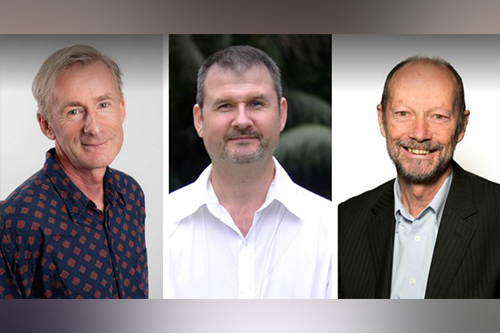
To sat that the last twelve months have seen a string of successes for the University of Wollongong (UOW) is an understatement.
Last year, UOW received a Spotlight Award in the Global Teaching Excellence Awards, which recognise and celebrate institution-wide commitment to the pursuit of teaching and learning excellence. This was followed up with UOW's Global Enterprises winning the 2018 National Export Award for excellence in education and training.
In August this year, a research team from the University won the 2019 NSW Environment, Energy and Science (DPIE) Eureka Prize for Environmental Research. This was followed by another accolade in October when the University’s Sydney Business School was named by Financial Times as one of the world’s best for its practices – especially its projects that result in significant social impact.
On Monday, the spotlight again shone on UOW when three of the University’s academics were honoured with a prestigious award.
The three academics were elected as Fellows of the Academy of Social Sciences in Australia (ASSA) in recognition of their distinguished achievements and the exceptional contributions they have made to their disciplines.
The Academy of the Social Sciences in Australia, established in 1971, aims to advance social policy and thinking by promoting research and its application.
Fellowship of the Academy of Social Sciences (FASSA) is an honour conferred for scholarly distinction in research or the advancement of social sciences. Fellows are elected by their peers in recognition of distinguished achievements and exceptional contributions made to the social sciences.
Professor Gordon Waitt, Professor Mark McLelland and Professor Terry Walter were announced as Fellows on Monday 11 November, and will be inducted into the Academy on Wednesday 13 November in a ceremony in Canberra.
In total, 37 leading economists, lawyers, psychologists, sociologists, geographers and philosophers from across Australia were elected as new Fellows.
Academy President Professor Jane Hall said the new members bring an exciting and impressive depth of expertise to the work of the Academy.
“These new members are really at the cutting edge in social research and policy, and they’ve all made enormous contributions to their fields,” she said.
Professor Gordon Waitt
Gordon Waitt is Head of the School of Geography and Sustainable Communities and a member of the Australian Centre for Culture Environment Society and Space (ACCESS).
He said election to the Academy provided exciting new possibilities.
A cultural geographer, Professor Waitt is interested in the social impacts of energy poverty and household sustainability. Central to his research is the importance of everyday experiences. His latest research investigates the challenges of bicycles as a solution to traffic congestion, young people’s use of sports betting applications and the everyday experiences of individuals who rely upon powered mobility devices.
“Geography is a discipline that offers a whole range of theoretical and methodological tools to help understand the world through a focus on the spatial. The discipline of Geography does not shy away from researching the social and environmental challenges of our time,” Professor Waitt said.
“My focus has been on the mundane, routine activities like, switching on electric appliances, driving a car, walking, and most recently cycling. Hence, these ideas become important when thinking about the challenges posed by increased energy costs, changing climates and urban liveability.”
Professor Terry Walter
Terry Walter is a Professorial Fellow in the School of Accounting, Economics and Finance.
“I am flattered and delighted to be a Fellow of the Academy of Social Sciences in Australia,” Professor Walter said.
“Social science research is sometimes undervalued but the combined impact of the ASSA Fellows is undeniable.”
Professor Walter specialises in applied empirical research in a wide range of topic areas. These include empirical tests of finance theory as it relates to the behaviour of capital markets; models of earnings management, accounting information and capital markets, market microstructure, takeovers and mergers and initial public offers, anomalies in empirical capital market evidence; behavioural finance, performance of mutual funds, executive remuneration and corporate governance.
“My research has primarily involved empirical tests to investigate and resolve anomalies. My recent work on the fees charged in superannuation and the principles for the design of efficient managerial remuneration systems have wide ranging implications,” Professor Walter said.
“My work helps make our capital markets more fair and efficient. Markets with these attributes benefit the supply of low-cost capital to a myriad of investment opportunities.”
Professor Mark McLelland
Mark McLelland is a Professor of Gender and Sexuality Studies in the School of Humanities and Social Inquiry. His research has focused on the post-war history of Japanese cultures of sexuality and the development of the internet in Japan.
Major publications from this project include the book Queer Japan: From the Pacific War to the Internet Age and Love, Sex and Democracy in Japan during the American Occupation. The latest output from this project is a 2018 essay on Japanese sexologist Takahashi Tetsu in the University of California Press collection A Global History of Sexual Science.
Professor McLelland is currently working on a follow-on volume to his book on sexuality during the American occupation of Japan.
Professor McLelland serves on a number of scholarly and advisory bodies including a three-year term on the Australian Research Council’s (ARC) College of Experts (2015-18). He has also served as an expert reader for the ARC Discovery Grants scheme and the Research Grants Council of Hong Kong.


